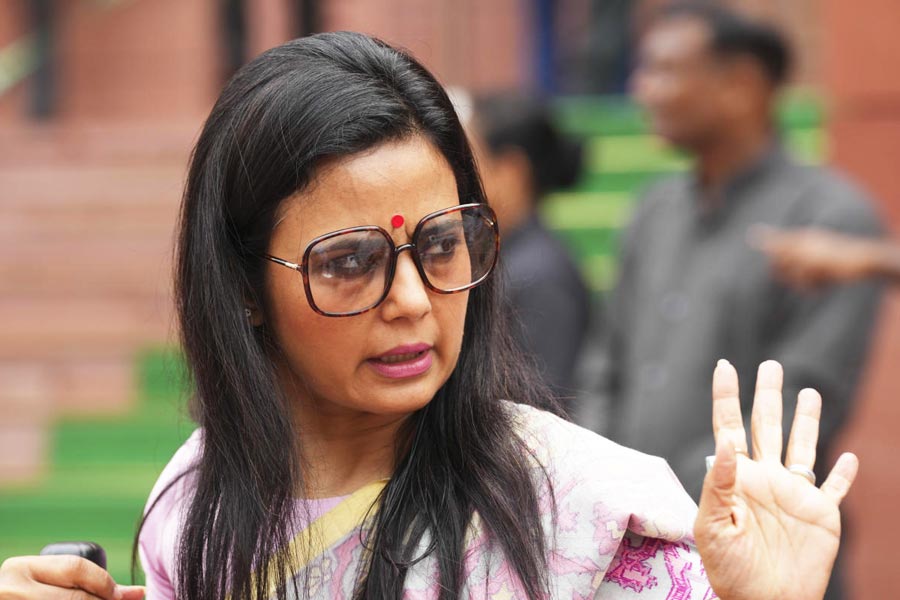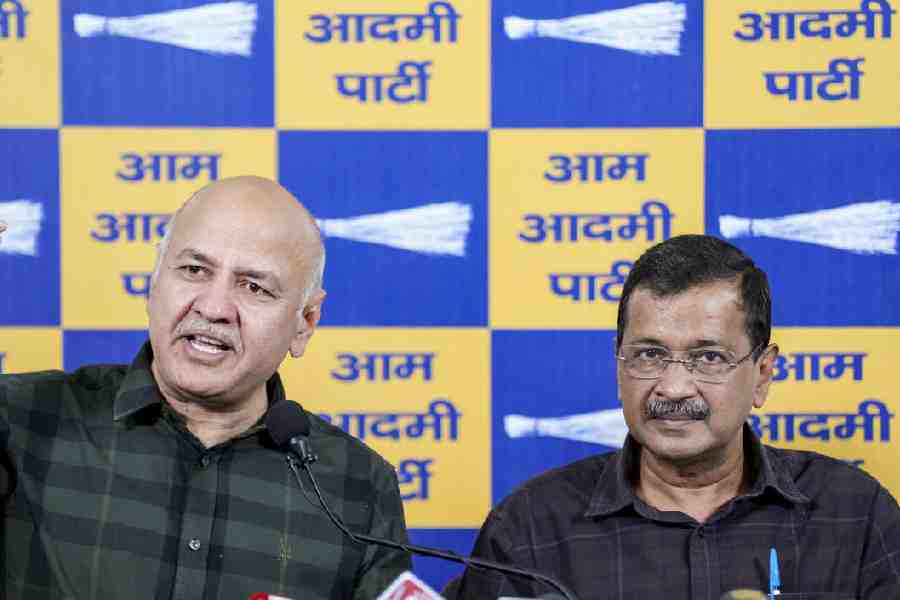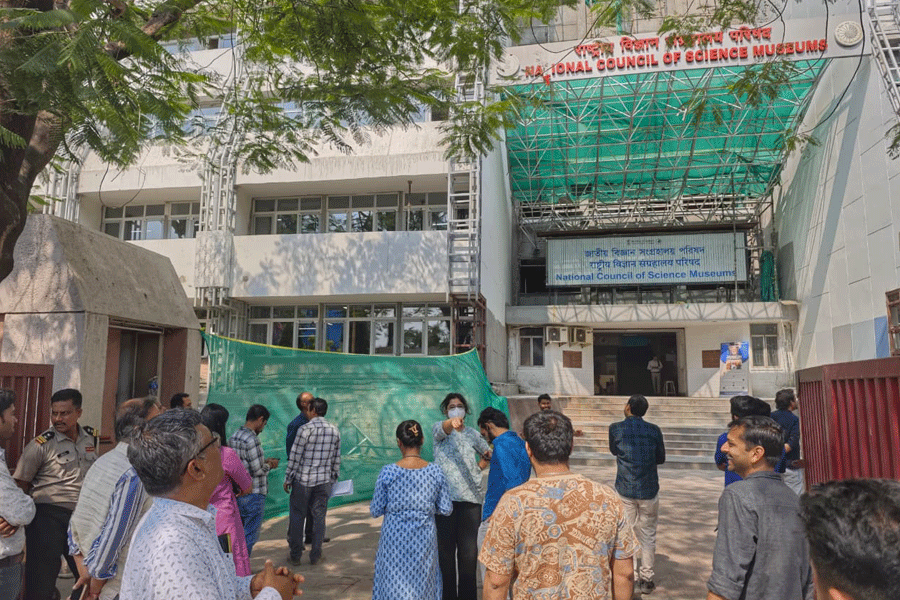 |
| Illustration: Ashoke Mullick |
Strangers tend to come sheathed in silence. Going by that, Wajahat Habibullah is no stranger. Not in Kashmir, where he helped douse flames that threatened to sear its people. Not now, as he sits in his living room in New Delhi and remembers the old days with laughter and sorrow. And certainly not when he makes a point about a compassionate stranger by bursting into song.
He first recites it in Urdu, then sings it out aloud, and finally translates it for you: “(He was) a stranger who was an outsider, but he was sympathetic.” He can’t remember the name of the singer. “Bibi,” he calls out to his wife in his soft, well-modulated voice, hoping that she’d nudge his memory. She does: it was Mehdi Hassan who sang Ek ajnabee jo gair tha, woh gham guzaar tha.
We are discussing his book My Kashmir: The Dying of the Light, recently launched by Penguin, his memoirs of his two stints in the Valley. It’s not often that a bureaucrat — and a central government officer at that — earns the love of Kashmiris walled in by suspicion of all matters central. But Habibullah, as old Kashmir hands point out, was much loved in the Valley.
“The affection built over time,” he says, after recalling the song. “It went to this extent because I was a part of their suffering. And I was sympathetic: I lent a hand, and I lent an ear to their sadness. I keep telling my Kashmiri friends that I may be a Lucknawi from Uttar Pradesh, but in my heart I am a Kashmiri.”
Wajahat Habibullah is also a storyteller. Each one of his anecdotes is a gaily-wrapped nugget that he plucks out of a treasure trove of memories. And each story is more enticing than the other. There’s that one about a young Rahul Gandhi eating octopuses. Another relates to schoolboy Sanjay Gandhi looking for oysters. Then there’s Aruna Roy, running with him around a tree.
The information rights activist and Habibullah acted in a skit when they were both studying in Delhi University. He was the hero and she, the heroine. The current secretary-general of the Rajya Sabha was the tree, he says, and claps his hands in delight.
The hero was poor, and the heroine’s rich father wouldn’t let her marry him. “I’ll cut off your legs first,” he says in chaste Hindi, giving it all the melodrama that the cruel father’s lines deserve. Not my leg, says the distraught daughter (and this bit Habibullah recites in a near falsetto). That was the script. The problem was that Roy — then Jayaram — would always wrongly use the masculine mera instead of the feminine meri taang (my leg) — much to her hero’s consternation.
Years later in 2005, when he was appointed the first chief information commissioner, an office set up because of Roy’s tireless campaign for the right to information, he told her: “We can go back to the skit — I am again the hero, you are the heroine. But I only hope you won’t say mera taang.” He laughs at the memory and adds, “Now, of course, she has mastered Hindi.”
The two joined the Indian Administrative Service together in 1968. But Habibullah says it was not his first choice. Young Wajahat, as a student at Doon School, wanted to be in the Army. His headmaster, however, suggested to his father, Major General Ibrahim Habibullah — known as the Red General for his Left leanings — that the civil services would suit him better.
So he studied history at St Stephen’s College in Delhi, sat for the civil services, ranked tenth, and went on to join the IAS. He didn’t list Uttar Pradesh as his cadre state because his mother was a minister in Lucknow in Kamlapati Tripathi’s government. Besides, he wanted to work for a “less advanced” state.
Habibullah — the only Muslim in the entire services in his batch (as he learnt later from journalist Chanchal Sarkar) — was given the Muslim-dominated state of Jammu and Kashmir. “I suppose it was a little ironical,” he says.
His first stint there from the Seventies to the early Eighties, he says, was professionally satisfying. He brought his bride — his cousin Shahila — to Kashmir, and remembers how he had to take her to a thanedar because she was a Pakistani citizen. But it was during his second term from 1991 to 1993 that he built an abiding relationship with the state and its people. “That’s because I saw so much suffering. I saw fear, and I saw terror. I saw overriding pain. And I felt pain. The Kashmir I saw will never be there again,” he says. That’s why, he adds, he called his book The Dying of the Light, borrowing lines from Dylan Thomas’s poem on his father’s death.
After Habibullah’s first Kashmir tenure, he joined the Prime Minister’s Office (PMO) in Delhi under Rajiv Gandhi. The second term ended abruptly with a car crash.
This was during the Hazratbal crisis, when government troops had laid siege to militants holed up inside the shrine. Habibullah was negotiating with the rebels. “It was probably the greatest challenge that I faced in my entire career,” says the 66-year-old bureaucrat, now the chairman of the National Commission for Minorities.
Some — especially sections in the Army — thought his approach was too soft. He wanted to send food inside the shrine to the militants, a move that was vociferously opposed by senior officers. Finally, he says, he got a go-ahead from the then Prime Minister, P.V. Narasimha Rao. “He gave me his wholehearted support, and told the Governor: Please do what Mr Habibullah suggests. Which then worked out into a peaceful negotiation.”
But rumours that he was sending biryani to the militants in the shrine turned into an issue, with the Opposition describing it as symbol of the government’s weak stand on militants.
Habibullah laughs when I bring this up. “First, I hadn’t given any biryani. And second, the Kashmiris don’t like biryani. If I gave them biryani, they would throw it away,” he says.
But the siege was finally lifted, and Habibullah earned the goodwill of the Kashmiris. So much so that few believed the car crash was an accident. Rumours floated then that it was an attempt from within the government to get rid of him.
“But, as you know, if the government is not satisfied with my work, they don’t have to kill me for that! They just have to transfer me,” he says. “But Kashmiris still believe that. Officials have told me: ‘Aapko nahin pata — hame pata hai (you don’t know, but we know)’,” he says, in a voice suitably sepulchral.
Habibullah was so badly wounded that few had thought he’d get out of it unscathed. But he did, thanks primarily to Sonia Gandhi who rushed a senior neurosurgeon to Kashmir, and had him sent abroad for treatment. “She was the primary person responsible for seeing that I got the best treatment abroad,” he says.
The bureaucrat has always been close to the Gandhis. His family had ties with the Nehrus, and his grandfather, the vice-chancellor of Lucknow University, knew Motilal Nehru. Rajiv Gandhi was a year senior to Habibullah at Doon, and Sanjay, a year junior. During one school break, the Gandhi boys with their mother visited the National Defence Academy in Khadakwasla, which General Habibullah had helped set up. Wajahat recalls telling Sanjay that the shells they picked up by the lake were oyster shells with pearls in them. After the holidays, a very grim Sanjay accosted him in school. “Those were not oysters,” he said.
Years later, when Rajiv Gandhi died, Habibullah wanted to resign from the service. “I had been very unhappy in Kashmir and I had thought I would work with Rajiv. Then he passed away, and I was so terribly upset that I offered to resign and help with the Rajiv Gandhi Foundation. Sonia Gandhi made me secretary on the condition that I wouldn’t resign.”
His closeness to 10 Janpath has often been cited as the reason Habibullah has been given coveted assignments. After Kashmir, he was in the embassy in Washington (where he famously erected a statue of Mahatma Gandhi, making sure that it towered over that of Winston Churchill, placed on the other end of the same road). Now, as the head of the National Commission for Minorities, he has his hands full. “We are in the process of fine-tuning our own responsibilities and work,” he says.
One of his other enjoyable tenures was as the administrator of Lakshwadeep. When his term at the PMO was to end, Rajiv Gandhi asked him where he would like to be posted. “I think he was waiting for me to say the World Bank, or something like that. I said I would like to go to Lakshwadeep. He said, be very careful. I’ll do exactly as you are asking me. I said that I actually wanted to go there. I had gone there once and fallen in love with the place.”
Gandhi and his family holidayed with him there, and young Rahul discovered a liking for octopuses. Habibullah shuts his eyes and shudders delicately. “What does it taste like, I asked him. Rahul replied, it tastes like chewing gum.”
We flit from the past to the present, and return to Kashmir — the land that he describes in his book as “beautiful, troubled, captivating”. We are about to wind up, and I ask him about the future of Kashmir. The only lasting solution for Kashmir, he says, is freedom. “Freedom is not necessarily independence. It means living life as a free citizen in a free country.”
The stranger who was sympathetic, clearly, still cares.










